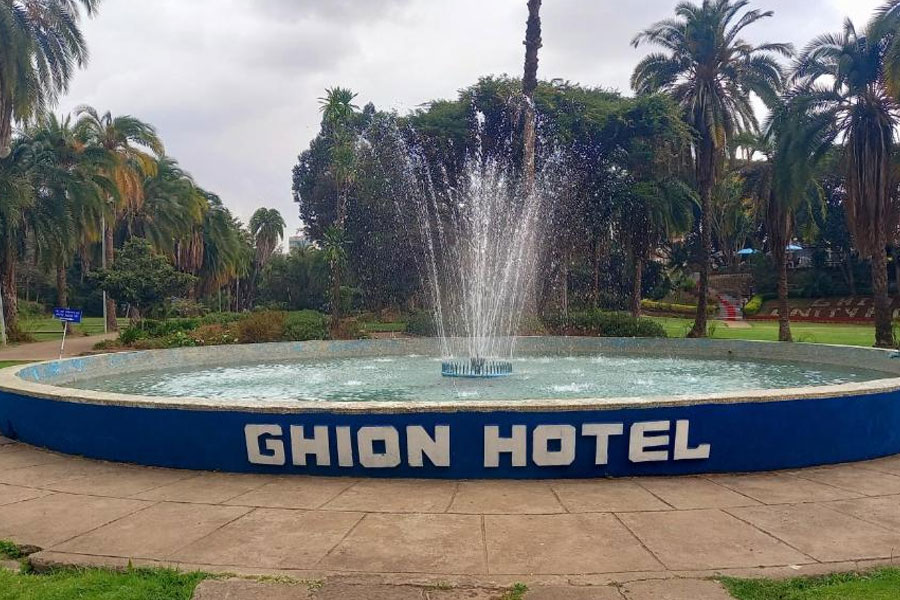
Radar | Jun 29,2019
Apr 25 , 2020
By FASIKA TADESSE ( FORTUNE STAFF WRITER )
The hotel room occupancy rate in the capital has fallen sharply to two percent for the first time in years, according to the latest survey conducted by the Addis Abeba Hotel Owners Trade Sectoral Association (AHA).
The hotel industry, which recorded a 64pc average occupancy rate in the last fiscal year with an average daily rate of 72 dollars a room, is one of the businesses hit hardest by the economic downturn caused by Novel Coronavirus (COVID-19). After Ethiopia reported the first case in mid-March, the occupancy rate slumped to below two percent, leading to losses of 35 million dollars in revenue a month.
"Hotel owners with heavy debt burdens are now feeling the heat and realising the industry could fall into a tailspin," reads the report, "leading to a potential uptick in defaults."
Out of the 130 member hotels of the Association, 88pc of them have closed their doors partially or fully due to low occupancy rates. About 56pc of them have fully ceased operations. A number of the remaining hotels are serving as quarantine centres for travellers entering Ethiopia. A total of 23 hotels are serving is this capacity - including Skylight, Ghion, Azzeman, Saphire and Harambe hotels - providing a total capacity of 1,700 beds.
Two weeks ago, Hyatt Regency, one of the 10 internationally franchised hotels in the capital, temporarily closed its doors for almost two months and granted paid vacation to its more than 500 employees. Many of the local brand hotels have also stopped operations due to the loss of business.
Following this, the Association has been working with the government over the past several weeks to mitigate the damage to the industry, according to Biniam Bisrat, president of the Association, whose member hotels have 8,667 rooms at an average of 67 rooms a hotel. The largest share of member hotels, about 38pc, have a three-star rating.
The Association is in a series of discussion with officials of the Ministry of Finance and the National Bank of Ethiopia (NBE) over loan rescheduling as well as soft loans with a lower interest rate, according to Biniam.
"We want the banks to share our burden," he said. "We understand the operational and other costs they incur, but they can help the industry by granting loans with a lower interest rate that will enable the hotel owners to keep paying employees."
Out of its members of the Association, 105 of them have outstanding debt at banks, either because they borrowed for project financing or working capital.
"It's in our best interest to not lay off employees," Biniam told Fortune. "We invested a lot in them, and they're with us during the good times."
Globally, COVID-19 has affected 50 million jobs in the travel and tourism industry, according to a report from the World Travel & Tourism Council, which forecasted that it will take at least a year to 18 months for the industry to recover fully.
As a coping mechanism for the current situation, the hotels should come up with innovative strategies, according to Yonas Moges, the managing partner at Calibra Hospitality Consultancy, a firm that is known for bringing international brand hotels into the country.
"Most of the local hotels target foreigners and tourists as customers," Yonas said. "This has to be changed and they need to adjust themselves to cater to local customers by making their food and beverages affordable."
Yonas adds that the government should provide a way for hotel owners to get soft loans from the Commercial Bank of Ethiopia (CBE) or the Development Bank of Ethiopia (DBE) to enable them to pay salaries for at least six months. He also advises the hoteliers to give away the perishable food items in their refrigerators to those who are on the front lines in the fight against COVID-19 as part of their corporate social responsibility.
Even after the COVID-19 pandemic is over, the Association, the Ministry of Culture & Tourism and the Ministry of Health should develop new calibrated hygiene and sanitisation standards that all hotels must comply with, Yonas recommended.
Most importantly, the hoteliers should maintain and properly keep the hotel facilities by cleaning the food storage areas and repairing the water pipe systems to avoid odors and dripping faucets while their buildings lie idle, he said.
"The hotel owners should think ahead on properly sanitising and disinfecting the entire facility of their hotels to make it ready for reopening," Yonas added.
PUBLISHED ON
Apr 25,2020 [ VOL
21 , NO
1043]

Radar | Aug 17,2019

Fortune News | Jun 11,2022

Sunday with Eden | Oct 10,2020

Viewpoints | Feb 06,2021

Fortune News | Sep 24,2018

Dec 22 , 2024 . By TIZITA SHEWAFERAW
Charged with transforming colossal state-owned enterprises into modern and competitiv...

Aug 18 , 2024 . By AKSAH ITALO
Although predictable Yonas Zerihun's job in the ride-hailing service is not immune to...

Jul 28 , 2024 . By TIZITA SHEWAFERAW
Unhabitual, perhaps too many, Samuel Gebreyohannes, 38, used to occasionally enjoy a couple of beers at breakfast. However, he recently swit...

Jul 13 , 2024 . By AKSAH ITALO
Investors who rely on tractors, trucks, and field vehicles for commuting, transporting commodities, and f...

Oct 25 , 2025
The regulatory machinery is on overdrive. In only two years, no fewer than 35 new pro...

Oct 18 , 2025
The political establishment, notably the ruling party and its top brass, has become p...

Oct 11 , 2025
Ladislas Farago, a roving Associated Press (AP) correspondent, arrived in Ethiopia in...

Oct 4 , 2025
Eyob Tekalegn (PhD) had been in the Governor's chair for only weeks when, on Septembe...